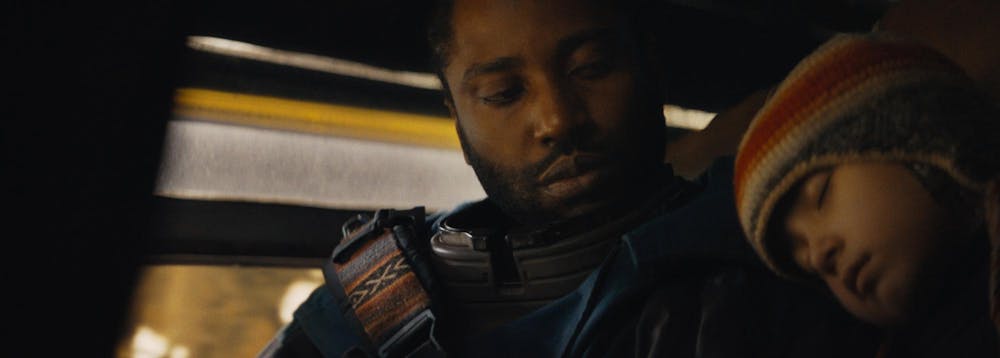Since its inception, the genre of science fiction has persisted due to its ability to project questions of today onto the technologies of tomorrow. It would seem that good science fiction must be political: To examine the ways cutting-edge science will be put into practice in the future, you must ask how people in power will use it.
“The Creator” — an original science fiction movie from director Gareth Edwards — understands this foundational genre model, but is unable to use it in a compelling way.
“The Creator” takes place in a post-AI world where the United States government has banned the technology due to a nuclear disaster it wrought decades ago. But such restrictions have not yet been set in place in the nation of New Asia. Joshua (John David Washington), a former undercover special forces op in New Asia, left his post after a U.S.-backed mission caused his pregnant wife Maya (Gemma Chan) to be killed. But Joshua is called back into duty when he is given reason to believe that Maya is actually alive and crucial to the U.S. military’s war against New Asia and its AI.
Joshua quickly sets off on a mission to hunt down the creator of a mysterious AI superweapon but finds that the weapon is actually a robotic child (Madeleine Yuna Voyles). Believing that she may be the key to finding Maya, Joshua breaks his orders to kill the child and instead travels across the region in search of the truth.
While AI might be a new frontier in the real world, it is anything but novel as a narrative device. From “2001: A Space Odyssey” to “Blade Runner,” the question of AI’s humanity and its ethical implementations have been explored to deeply contemplative degrees. These films, both created before there was any concrete conceptualization of what AI would like in the real world, seem to understand its implications far more than “The Creator” — a film made during the epicenter of deep real-life discussion of AI.
In an attempt to explore the U.S. government’s innate wickedness, the film also positions the American military-industrial complex as its main villain. But while the film’s critiques of the U.S. military’s predatory desire to enact control over foreign regions are valid, the message does not translate to this specific situation with AI.
The robot child, later given the name “Alphie,” is described as possessing such advanced programming that she has the potential to control all of the world’s technology with her mind. Yet the film never addresses the potential terror of this situation, opting to instead make Alphie a figure the audience should sympathize with. This is the film’s greatest weakness: its inability to address any nuance within the very complicated topic it set out to explore. The film essentially asks the question: “What if AI was actually good, and it’s the humans who are the root of evil?” While this is a question that has the potential to be interesting, “The Creator” comes nowhere near to adequately exploring it.
On top of that, the way the film goes about representing its characters — especially the citizens of the country under the criminally uninspired name of New Asia — perpetuates harmful stereotypes that plague much of science fiction. “New Asia” is nothing more than a neo-orientalized homogenous Asia in which everything is either a shanty town composed of poor farmers or a hyper-industrialized advanced megalopolis — a damning decision on the film’s behalf.
Ultimately, “The Creator” is an emotionally hollow movie with confusing moral messaging and a plot chock-full of tired cliches that take away from any potential for originality the film once promised.

Finn Kirkpatrick was the senior editor of multimedia of the Brown Daily Herald's 134th editorial board. He is a junior from Los Angeles, California studying Comparative Literature and East Asian Studies. He was previously an arts and culture editor and has a passion for Tetris and Mario Kart.





